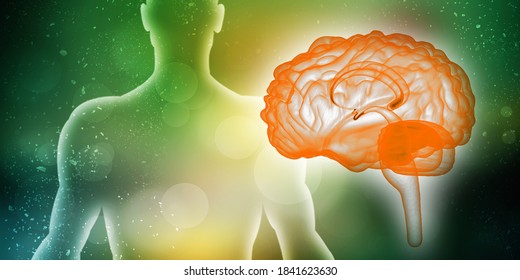

Your brain is the control center of your entire body. It shapes your thoughts, emotions, actions, and even how you experience life. Maintaining good brain health is not only about preventing memory loss—it’s about keeping your mind active, focused, and resilient. Just like physical fitness strengthens your muscles, caring for your brain keeps your mental abilities sharp throughout life.
In this article, we’ll explore what affects brain health, simple ways to protect it, and natural habits that can keep your mind clear and focused every day.

Brain health refers to how well your brain functions in areas such as memory, learning, concentration, and emotional balance. A healthy brain allows you to think clearly, make good decisions, and handle stress effectively.
Your brain constantly changes—it builds new connections and repairs old ones. But factors like poor diet, stress, lack of sleep, or inactivity can slow this process. The good news is, you can take control of your brain’s well-being through daily habits that boost its performance and longevity.
Having good brain health is essential for quality of life. It influences how you work, study, communicate, and even age. A strong brain helps you stay productive, creative, and emotionally stable.
When brain function starts to decline, people may notice memory problems, difficulty focusing, or slower decision-making. Taking preventive steps now ensures your brain stays active, alert, and youthful for years to come.
Your brain sends signals when it’s under stress or strain. Watch out for these signs:
These symptoms don’t always mean something serious—but they suggest your brain might need better nourishment, rest, and balance.
Your brain thrives on good nutrition. Diets rich in omega-3 fatty acids, antioxidants, and vitamins can support memory and cognitive function.
Include foods such as:
Healthy eating keeps blood flowing smoothly to the brain, delivering oxygen and nutrients it needs to function properly.
Exercise doesn’t just strengthen your body—it boosts your brain health too. Physical activity increases blood flow to the brain, enhances mood, and stimulates the growth of new brain cells.
Simple habits like walking, yoga, or dancing a few times a week can improve memory and focus. Even light activity helps reduce stress hormones that damage brain cells.
Sleep is when your brain repairs and reorganizes itself. Lack of sleep can harm your focus, reaction time, and emotional balance. Adults should aim for 7–9 hours of restful sleep each night.
A consistent bedtime routine and a calm environment can do wonders for your mental clarity and overall brain health.
Chronic stress can harm your brain’s structure and function. It affects memory, focus, and emotional regulation. Practices like deep breathing, meditation, and spending time in nature can reduce stress and protect your brain from burnout.
Challenging your mind keeps it sharp. Read books, learn a new skill, play an instrument, or solve puzzles. These activities build new neural connections, strengthening your brain health and slowing cognitive decline.
For more brain health tips, visit Synaptigen .
Your lifestyle habits directly affect how your brain performs every day.
A balanced lifestyle—rich in good food, movement, and mental activity—helps your brain thrive at every stage of life.
Emotions play a huge role in brain health. Positive emotions like joy, gratitude, and love stimulate the release of hormones that promote brain growth and creativity. Negative emotions, if unmanaged, can cause stress and inflammation.
Practicing mindfulness and gratitude daily helps maintain emotional balance, which strengthens your mental resilience.
You don’t always need complicated routines to protect your brain. Small, consistent steps can make a big difference.
Dehydration can affect memory, concentration, and alertness. Drink enough water throughout the day to keep your brain functioning smoothly.
Too much screen exposure can strain your eyes and overload your brain. Taking regular breaks helps your brain rest and reset.
Nature has a calming effect that supports emotional well-being. Fresh air and sunlight boost your mood and improve brain performance.
Social interaction stimulates the brain and helps prevent memory loss. Engage in meaningful conversations and maintain healthy relationships.
As we age, some cognitive decline is natural. However, adopting brain-friendly habits can slow down this process. Staying mentally active, eating well, and keeping stress levels low can help maintain sharp memory and clear thinking even in later years.
Older adults who continue learning new skills or engaging socially often enjoy better mental performance than those who stay inactive.
Understanding these facts helps you make better choices for your brain health.
Your brain and body are deeply connected. Physical health directly impacts mental performance. For example:
Caring for both your body and brain creates harmony that enhances energy, creativity, and happiness.
If you notice persistent forgetfulness, confusion, or trouble focusing, it may be time to review your lifestyle. These symptoms can often improve with better sleep, nutrition, and stress management. However, consistent symptoms should not be ignored—early action can protect your brain health from worsening conditions.
Your brain is your most powerful asset—treat it with care. Healthy eating, regular exercise, mental stimulation, and emotional balance all contribute to a sharp, resilient mind. The best part? These habits not only protect your brain health but also enhance your overall quality of life.
Small daily changes can have lifelong benefits. The earlier you start, the stronger your brain will stay.
For more brain health tips, visit Synaptigen .
This product is very helpful for this problem.